Date: November 13th, 2013 12:53:16 a.m.
| In case you cannot read this newsletter please press here |

|
| For the greek version of this newsletter please press here |
|
What we saw on the 6th Week of AGORA The sixth AGORA week opened with original collages with words taken from the speech of George Provopoulos, Governor of the Bank of Greece, turned into poems at Bankpoetry by Suvi Nurmi in the Machine room of Sofokleous. On the same day Giorgos Papadakis approached in his talk the role of innovation skills in contemporary times and how these skills can be cultivated through educational programs that combine art, technology and science. On Wednesday Fotini Gouseti and Taxideftes Politismou brought in AGORA the story of a collaboration that was triggered by research in Kalavryta for the creation of a cloth made of ties, following the steps of a narrative that comes straight from American aid to postwar Greece. On Thursday Nazima Kadir presented the Sitcom: Our Autonomous Life introducing the audience to the contrasts of social and squatters movements in the Netherlands, while on Friday Leda Papaconstantinou and Eleftheria Koheila revived moments, stories and scenes of the Spetses Players in the auditorium of Sofokleous. On Saturday Katerina Zaharopoulou conducted her first in situ performance at Varvakios Central Market, while at Sofokleous the afternoon started with the sixth meeting of the Value workshop in the Machine room, continuing with a lecture by Nazima Kadir, who revealed through her research issues of xenophobia that appear even inside radical movements, and moving on to the lecture performance Explaining the Crisis to a Young Dancer by Konstantinos Mihos, to close with the rock n' roll sounds of Caveman Joe. Sunday started with Soo-Young Kim considering an array of future-making practices in the context of the crisis, in order to examine how the construction and circulation of distinct futures serves as a crucial site for both establishing and contesting claims to knowledge and authority in the Greek present, while on the first floor of AGORA, Opsis in the context of the Pre-institutional Critique Workshop brought in the center of the discussion the work "Profligate Conqueror" by Arbit City Group. The week closed with KYKLOS, which this time evolved around Politics. Members of the teams Join Our Space, Vouli Watch, Referendums for Greece, Klirosi (Raffle), Dimovoulio Politon, Dimokratia Ideon (Democracy of Ideas), Protovoulia gia Riziki Syntagmatiki Allagi (Initiative for Radical Constitutional Change) and Politeia 2.0 joined in a discussion in AGORA that opened with a common observation about the lack of democracy in the country and wondered if there are any suggestions and models that provide a possible solution. |
The program of the seventh week of AGORA:For a detailed program of the seventh week of the 4th Athens Biennale AGORA, please visit our Calendar. |
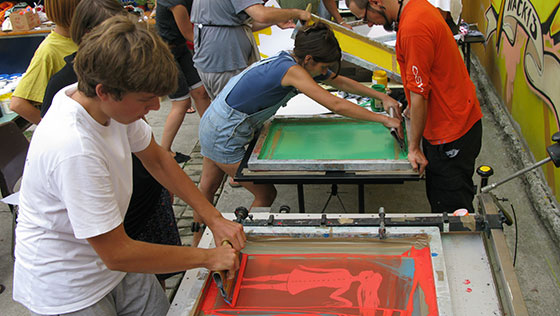
Cactus Network, Occupied Times, Skart, FalεναDeveloping a Visual Voice: Radical Print Workshop
This five-day workshop aims to enable participants to express their anger and concerns at the current social and economic situation and through discussion and creativity, develop them into a visual manifestation that communicates on the streets. We will be setting up an instant screen-printing area to mass produce your voices and distribute them wide and loud.
Tuesday 12, Wednesday 13, Thursday 14, Friday 14, 17:00 – 21:00 και Saturday 16/11, 12:00-17:00 8–10 Sofokleous st. Workshop Timeline:
Tuesday 12/11, 17:00-21:00, Machine room: Intro and Agora. Tony Credland and Glenn Orton have worked together as Cactus for 25 years. Collaborating with many other creative projects / activist groups such as Indymedia, Reclaim the Streets and the Occupy movement. Tony teaches on the MA in Graphic Design at LCC and Glenn is the art editor of the satirical magazine Private Eye. http://www.cactusnetwork.org.uk/ The Occupied Times of London is a not-for-profit newspaper born out of the Occupy movement and it is dedicated to socio-political, economic and environmental justice. The newspaper was founded in October 2011 during the first week of the occupation of St Paul's as an alternative to the mainstream media. Today it is still being produced collectively by activists, journalists, artists and designers and it is totally self-funded through donations. It has been developed into an independent publication and after 22 issues the paper is gaining publicity and provoking debate about the contribution of design to the contemporary protest movements. http://theoccupiedtimes.org/ Skart collective is founded in 1990 at the Faculty of Architecture in Belgrade. Focus of the collective is primarily between poetry and graphic design. Skart Collective is involved in several socially engaged actions and actively collaborates with few activist groups from Belgrade. http://www.skart.rs/ Falena was created in October 2013. It is an open group active mainly in Athens. Its purpose is to participate in the socio-political discourse through collective creativity in various artistic ways and expressive means. https://www.facebook.com/falena.falena.75?fref=ts |
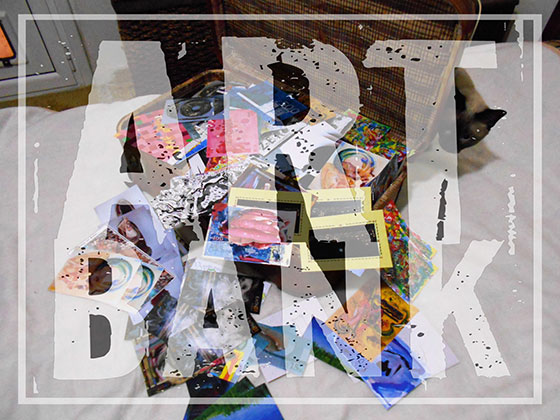
Art Bank
Art Bank will conduct in AGORA an art cash auction during the presentation of its action, which aims to the circulation of art money.
Participating Artists:
Tuesday, 21/11, 18:00–20:00, 8–10 Sofokleous st. |
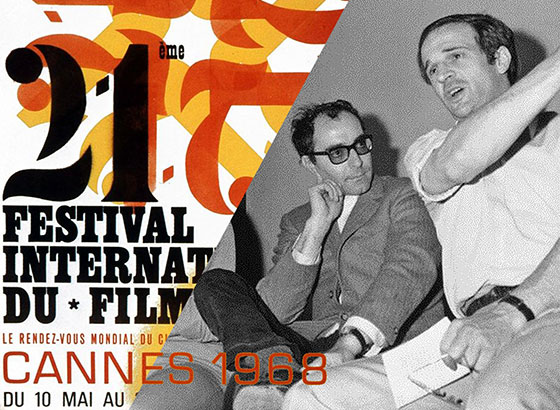
Zafos Xagoraris - "L'Ecran Noir"
With the collaboration of Marios Papageorgiou and Leonidas Kakaroglou
This ongoing project focuses on the historical event of the cancellation of the Cannes Festival in 1968 as an act of solidarity to the students and workers of Paris and other cities of France. Installations including interviews, film footage and other documentation material have been presented at Embros (2011) and Broadway theaters "Exchange", curated by Sofia Dona, 2012)
First Week Program: |
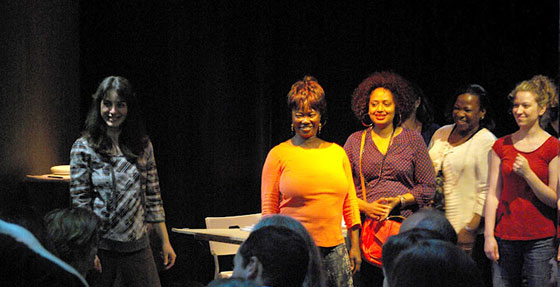
Theatre of the OppressedNo to Racism From the Cradle Brief Scenes of Everyday Violence ΙΙ: Nothing might as well happen...
No to Racism From the Cradle
Brief Scenes of Everyday Violence ΙΙ: Nothing might as well happen... The Theatre of the Oppressed was developed by Brazilian director Augusto Boal aiming to the active participation of the citizen in the commons, regardless of origin, education and social status. Basic principle of this theatrical method is that theatre can be used as a tool for change in a personal and social level. More specifically, with the technique of the Forum Theatre the audience is actively involved, the spectator becomes spect–actor, participating with his proposals to the removal of the oppression. The Forum Theatre is based on a brief improptu theatrical scene, which is connected to a broader social problem and depicts an unresolved conflict, an oppression or dead end. As the citizens gathered in the ancient agora to discuss the current issues of the city, the forum theatre grants a safe meeting place: the aesthetic-theatrical reconstruction of the oppressive reality. Through dialogue and interaction both audience and actors can explore, analyze and transform the living reality, so as to manage it outside this space as well. |
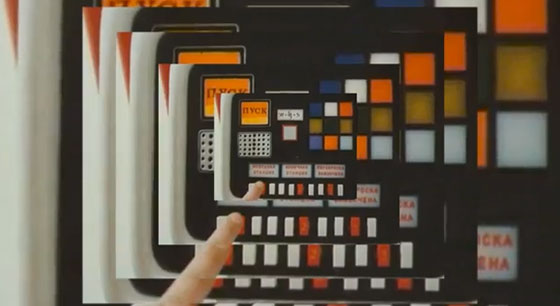
Τ23VAKMusic On Thursday, 14th of November, at the Athens Biennale auditorium, T23VAK will take place, a musical event that will involve participants from the wide electronic spectrum. The audience will synaesthetically co-react with the sounds, the visuals and the general symbolic stimulus. The aim is to create an opticoConcoctionaccoustic happening with experimental intervals and soundscapes that will be in a dialectical relationship with the historically charged location and the people.
Participants: Thursday 14/11, 19:00-21:00, 8-10 8–10 Sofokleous st. |

Katerina ZaharopoulouIn Agora (x) 4
Can an interview stand outside the media context? What is an on the road interview, apart from a reportage or opinion poll? How much can an everyday person, a person who lives, works or does not work in this contradictory city, penetrate the context of art and its structures? To what extent can artists dynamically infiltrate society? What exactly do they want to indicate with their images? Can we bring to the Athens Biennale people who do not know about it, people who simply do not know how to approach it? Is the relatively new trend in art for structures borrowed from other activities, like lectures, teaching etc., capable to involve the world inside and outside of it? Saturday, 16/11, 12:00–14:00, Ancient Agora – Plaka |

VALUELocating value, Presentation of the CHOROtAXIA Team The VALUE workshop organizes its seventh meeting between 5–8 pm, in the Machine room (mezzanine) of the former Athens Stock Exchange: Presentation of the CHOROtAXIA Team: Eleana Yalouri (coordinator), Christina Aggoura, Sofia Grigoriadou, Dora Zakka, Anastasia Kaisidou, Despina Maraki, Eliza Neofytou, Nicolas Papadimitriou. Locating value. Discussion coordinated by Kostas Giannakopoulos (social anthropologist). Participants: Amalia Zepou (Kerameikos resident-Municipality of Athens networking manager with groups of citizens), Panos Lappas (resident and cafe owner in Kerameikos), Olga Balaoura (architect), Alexander Vaitsos (architect), Pausanias Karathanasis (social anthropologist) and Cacao Rocks (street artist). Are the different aspects of value (economic, moral, aesthetic etc.) connected to each other and if so in what ways? Is the present situation experienced as a multilayered "crisis of values"? How does the "market" redefine today the value of life along with the value of things? The VALUE workshop proposes a two months' collaboration of visual artists, social scientists, and theorists from different fields, who will take the anthropological perspective on "exchange" as a point of reference, while attempting to comprehend and comment on the ways value is created and experienced in everyday life. Visitors to the 2013 Athens Biennale are invited to participate in the weekly meetings, in the discussions and production of artistic work by the workshop's curatorial team, as well as by invited artists and theorists. The workshop's program can be found online at valueab4.wordpress.com. Coordination: Elpida Rikou (social anthropology / visual arts). Saturday, 16/11, 17:00–20:00, 8–10 Sofokleous st. (Machine room) |

Center for Research and Dissemination of Music SchemingCobra
The Center for Research and Dissemination of Music Scheming introduces for the first time in Greece the game piece Cobra, by John Zorn. Saturday, 16/11, 21:00–22:00, 8–10 Sofokleous st. |

OPSISAntonis Pittas
The 4th Athens Biennale activates the artworks of the exhibition with the participation of the public. A series of meetings among public, curators and artists will take place in front of particular works aiming to an interpretational approach. An analysis of the relations among works, artistic practices will emerge through dialogue, while their connections to the thematics of this year's Biennale will also be discussed. Sunday, 17/11, 17:00–18:00, 8–10 Sofokleous st. |
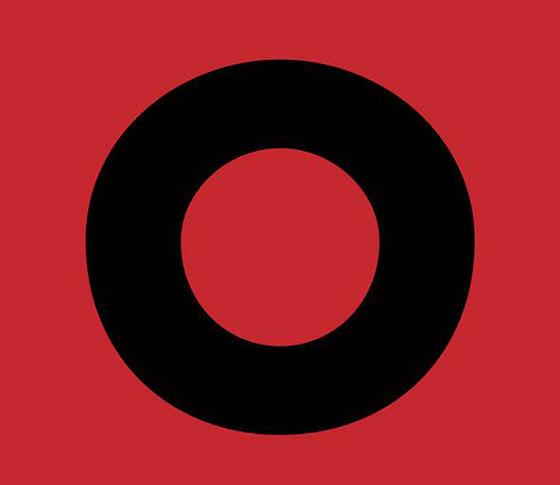
AGORA – KYKLOSInternet Kyklos is a series of loosely structured and pluralistic approaches on crucial issues that take place in AGORA Every Sunday afternoon. Invited to Kyklos, the teams and initiatives that actively touch these subjects will have 10-15 minutes in order to share their practical approaches as answers to the question Now what? On Sunday, 3 November, at 6:00 pm, Internet will be at the center of the fifth thematic unit of Kyklos, with the discussion enhancing placements by the teams Fab lab, P2P LAB, Common Fest, EL/LAK, Creative Common Greece, The omikron project, Labs.opengov. Sunday , 17/11, 18:00–20:00, 8–10 Sofokleous st. |
The program of the seventh week of AGORA is as follows:TUESDAY 12/1117:00 – 21:00 Cactus Network, Occupied Times, Skart collective, Falena Developing a Visual Voice: Radical Print Workshop, εργαστήριο, 8–10 Sofokleous (Machine room)18:00 – 20:00 Art Bank, 8–10 Sofokleous st. |
WEDNESDAY 13/1117:00 – 21:00 Cactus Network, Occupied Times, Skart collective, Falena Developing a Visual Voice: Radical Print Workshop, workshop, 8–10 Sofokleous st. (Machine room)18:30 – 20:30 Zafos Xagoraris, "L'Ecran Noir", Rozmarne leto του Jiri Menzel, presentation-screening, 8–10 Sofokleous st. 19:00 – 21:00 Theatre of the Oppressed, No to Racism From the Cradle, play, CAMP, 4 Efpolidos & 2 Apellou st. |
THURSDAY 14/1117:00 – 21:00 Cactus Network, Occupied Times, Skart collective, Falena Developing a Visual Voice: Radical Print Workshop, workshop, 8–10 Sofokleous st. (Machine room)17:00-19:00 Zafos Xagoraris, "L'Ecran Noir", Yabu no naka no kuroneko by Kaneto Shindō (english subtitles)-(100΄), screening, 8–10 Sofokleous st. 19:00-22:00 Τ23VAK, music, 8–10 Sofokleous st. |
FRIDAY 15/1117:00-19:00 Zafos Xagoraris - "L'Ecran Noir", Banditi a Milano (1968) του Carlo Lizzani (english subtitles)-(98΄), screening, 8–10 Sofokleous st.17:00-21:00, Cactus Network, Occupied Times, Skart collective, Falena Developing a Visual Voice: Radical Print Workshop, workshop, 8–10 Sofokleous st. (Machine room) 19:00-21:00 Theatre of the Oppressed, Brief Scenes of Everyday Violence ΙΙ: Nothing might as well happen..., play, CAMP, 4 Efpolidos & 2 Apellou st. |
SATURDAY 16/1112:00–14:00 Katerina Zaharopoulou, In Agora (x) 4, performance, Ancient Agora - Plaka12:00–17:00 Cactus Network, Occupied Times, Skart, Falena, Developing a Visual Voice: Radical Print Workshop, workshop, 8–10 Sofokleous st. 16:00–18:00 Zafos Xagoraris, "L'Ecran Noir", Das Schloss (The castle)-(1968) by Rudolf Noelte, screening, 8–10 Sofokleous st. 17:00–20:00 Value workshop: Locating value (discussion; coordination: Κ. Giannakopoulos), HOROtAXIA team (presentation: S. Grigoriadou, Α. Kaisidou, D. Maraki, Ε. Neofytou, N. Papadimitriou, Ε. Yalouri, D. Zakka), AB4: Mapping efforts (visual arts project: K. S. Grigoriadou), Mapping emotions (happening: K. Ν. Papadimitriou, D. Zakka), 8–10 Sofokleous st. (Machine room) 21:00–22:00 Center for Research and Dissemination of Music Scheming, Cobra, music, 8–10 Sofokleous st. |
SUNDAY 17/1116:00–18:00 Zafos Xagoraris, "L'Ecran Noir", O slavnosti a hostech (The party and the guests)-(1966) by Jan Němec, screening, 8–10 Sofokleous st.17:00–18:00 OPSIS, Antonis Pittas, 8–10 Sofokleous st. 18:00–20:00 AGORA KYKLOS, Internet, series of discussions, 8–10 Sofokleous st. |
4th ATHENS BIENNALE 2013 AGORANational Bank of Greece Building, 8–10 Sofokleous str.CAMP Contemporary Art Meeting Point, 4 Eupolidos & 2 Apellou str. 29th September – 1st December 2013 |
OPENING HOURSNational Bank of Greece Building, 8–10 Sofokleous str.CAMP Contemporary Art Meeting Point, 4 Eupolidos & 2 Apellou str. Tuesday–Friday: 13.00–21.00 Saturday & Sunday: 10.00–22.00 |
ADMISSIONAGORA offers a season ticket for the exhibition for 8 euros. The season ticket allows admission throughout the two months of the 4th Athens Biennale and for all the events hosted by the AGORA. Additionally, AGORA offers a daily ticket for 5 euros and a discount ticket for 3 euros, for students who hold a student ID, teens 12–18 years old and senior citizens (70 years old or above). Holders of the Manpower Employment Organization q(OAED) card, students of the Athens School of Fine Arts, members of the Chamber of Fine Arts of Greece, ICOM, AICA, IKT as well as special needs attendants are granted free entrance with appropriate ID. |
| For high resolution photographs, please visit the PRESS page of the AGORA webpage and the AGORA Facebook , Twitter, Instagram, Pinterest, Tumblr, YouTube, Vimeo pages. |
|
For more information please contact: Katerina Stavroula, Press Officer T: 0030 210 52 32 222, 210 52 32 224, Email: press@athensbiennial.org |
 |
|
<< Previous: 4th Athens Biennale 2013 AGORA WEEK 6 |
| Archive Index | |
Athens Biennale
Subscribe to Athens Biennale: